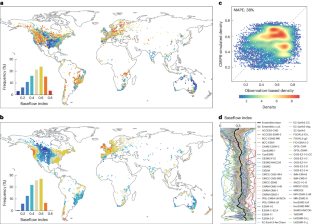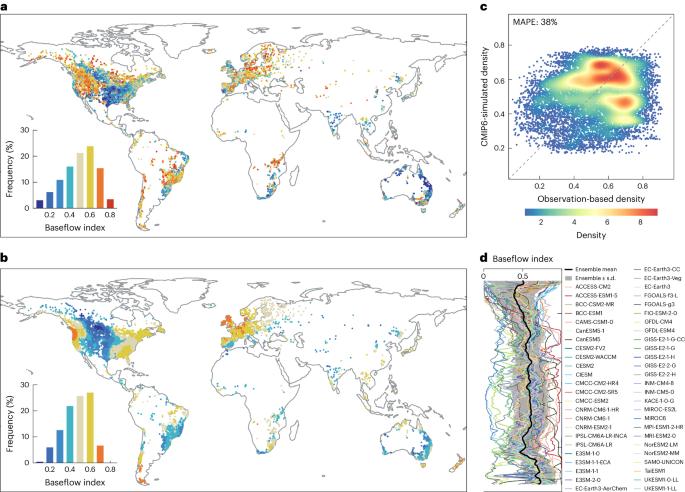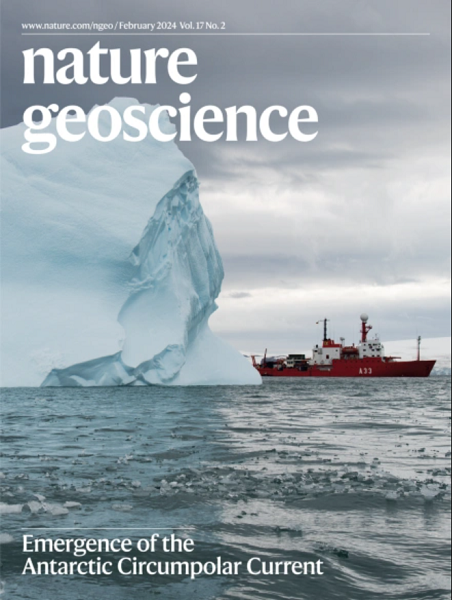Majority of global river flow sustained by groundwater
IF 15.7
1区 地球科学
Q1 GEOSCIENCES, MULTIDISCIPLINARY
引用次数: 0
Abstract
Groundwater-sustained baseflow is a vital source of river flow, especially during dry seasons. The proportion of river flow sustained by baseflow—the baseflow index—is essential for assessing fluvial nutrient cycling and contaminant transport. However, the global baseflow index remains highly uncertain, with current Earth system model simulations ranging from 12% to 94%. Here we estimate the global baseflow index to be 59% ± 7% based on an emergent constraint approach, which integrates 50 Earth system models with baseflow indices derived from streamflow observations in 15,567 basins. Our observational constraint indicates that at least 21% ± 3% of precipitation recharges groundwater, which is approximately double the figure reported in the Sixth Assessment Report of the United Nations Intergovernmental Panel on Climate Change. Thus, our research suggests a more active role of groundwater in the global water cycle than most Earth system models currently simulate. We present evidence that the considerable disagreement in simulated baseflow stems from unrealistic and varied model representations of infiltration, aquifer structure and groundwater dynamics. These processes should be prioritized so that models can capture active groundwater–river connections. Groundwater supplies about 59% of global river flow, suggesting a larger contribution of groundwater to the global water cycle than currently appreciated, according to an analysis integrating estimates from models and observations.


全球大部分河流流量靠地下水维持
地下水维持的基流是河流流量的重要来源,尤其是在干旱季节。基流维持的河流流量比例--基流指数--对于评估河流营养循环和污染物迁移至关重要。然而,全球基流指数仍然存在很大的不确定性,目前地球系统模型模拟的基流指数从 12% 到 94% 不等。在这里,我们根据一种新出现的约束方法,将 50 个地球系统模型与从 15567 个流域的溪流观测中得出的基流指数相结合,估计全球基流指数为 59% ± 7%。我们的观测约束表明,至少有 21% ± 3% 的降水补给了地下水,这大约是联合国政府间气候变化专门委员会第六次评估报告中报告的数字的两倍。因此,我们的研究表明,地下水在全球水循环中的作用比目前大多数地球系统模型模拟的更为积极。我们提出的证据表明,模拟基流中存在的巨大差异源于模型对渗透、含水层结构和地下水动态不切实际的不同描述。应优先考虑这些过程,以便模型能够捕捉到地下水与河流之间的活跃联系。
本文章由计算机程序翻译,如有差异,请以英文原文为准。
求助全文
约1分钟内获得全文
求助全文
来源期刊

Nature Geoscience
地学-地球科学综合
CiteScore
26.70
自引率
1.60%
发文量
187
审稿时长
3.3 months
期刊介绍:
Nature Geoscience is a monthly interdisciplinary journal that gathers top-tier research spanning Earth Sciences and related fields.
The journal covers all geoscience disciplines, including fieldwork, modeling, and theoretical studies.
Topics include atmospheric science, biogeochemistry, climate science, geobiology, geochemistry, geoinformatics, remote sensing, geology, geomagnetism, paleomagnetism, geomorphology, geophysics, glaciology, hydrology, limnology, mineralogy, oceanography, paleontology, paleoclimatology, paleoceanography, petrology, planetary science, seismology, space physics, tectonics, and volcanology.
Nature Geoscience upholds its commitment to publishing significant, high-quality Earth Sciences research through fair, rapid, and rigorous peer review, overseen by a team of full-time professional editors.
 求助内容:
求助内容: 应助结果提醒方式:
应助结果提醒方式:


